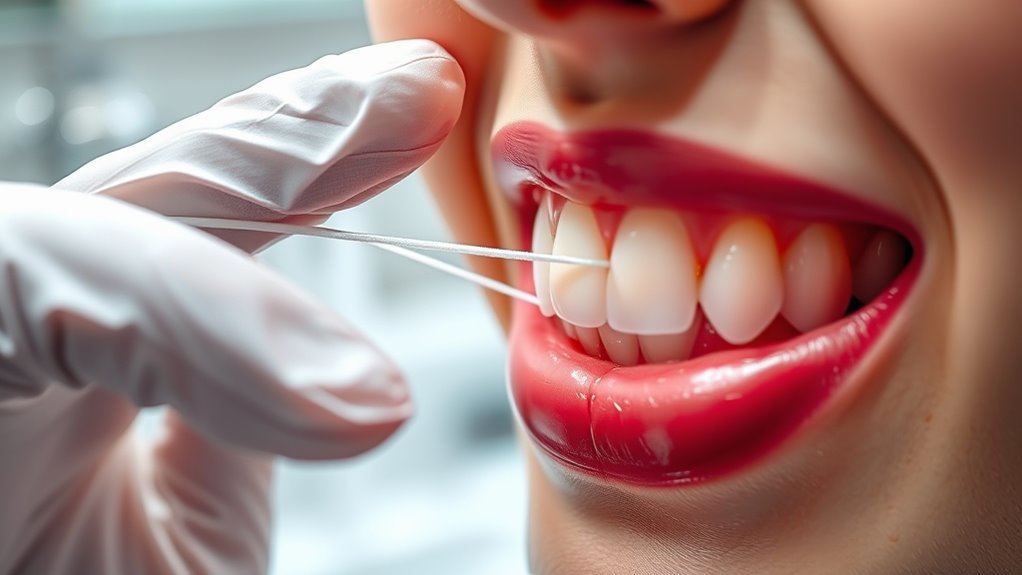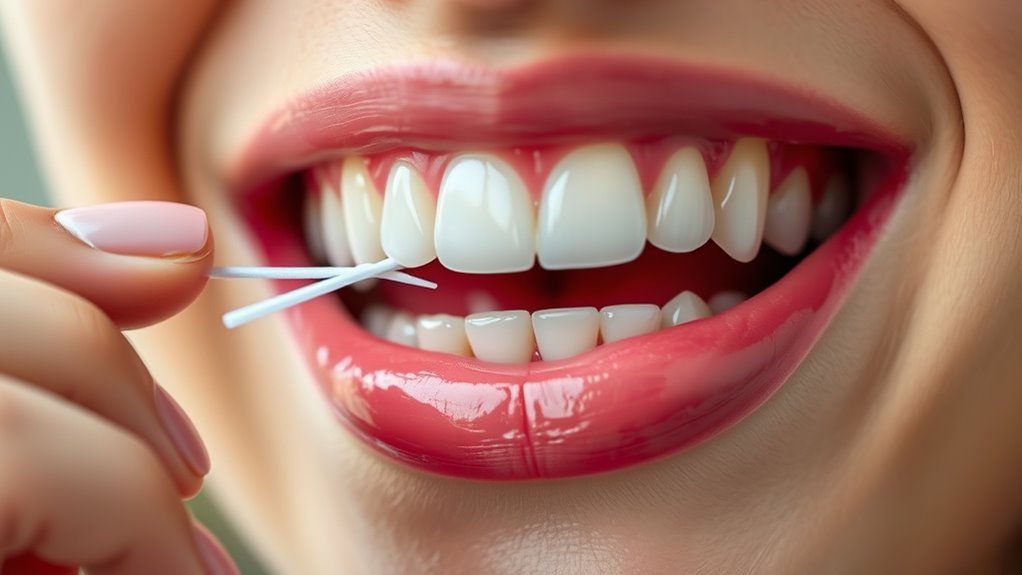Flossing is essential for maintaining a healthy oral microbiome, which directly impacts your whole-body health. By preventing plaque buildup and disrupting harmful bacteria, flossing helps keep your mouth balanced and reduces inflammation. A balanced microbiome supports your immune system and lowers risks of systemic conditions like heart disease and diabetes. Keep up your oral hygiene routine, and you’ll discover how small daily habits can protect your overall health in surprising ways.
Key Takeaways
- Flossing removes food particles and disrupts biofilm, maintaining microbial diversity in the oral microbiome.
- A balanced oral microbiome prevents harmful bacteria from dominating, reducing the risk of cavities and gum disease.
- Proper flossing supports immune regulation and reduces inflammation in the mouth, promoting overall health.
- Maintaining oral microbial balance through flossing may lower systemic disease risks like heart disease and diabetes.
- Consistent flossing contributes to a healthier oral environment, positively impacting whole-body health over time.

Have you ever wondered what lives inside your mouth? Beneath your tongue and between your teeth, a bustling community of tiny microorganisms thrives. This community, known as the oral microbiome, is incredibly diverse and plays a essential role in your overall health. One of the most noticeable aspects of this microbial world is dental plaque, a sticky film that forms on your teeth’s surface. Dental plaque isn’t just a layer of bacteria; it’s a dynamic environment teeming with microbial diversity, where hundreds of different species coexist and interact. This diversity is fundamental because it influences how your mouth responds to bacteria, sugars, and other substances. When the balance of this microbial community shifts, it can lead to issues like cavities, gum disease, and even impact your body’s immune response.
The formation of dental plaque begins with the rapid attachment of bacteria to the tooth surface after brushing or eating. These bacteria secrete sticky substances that trap food particles and other microorganisms, creating a biofilm—a complex, living matrix. Over time, if plaque isn’t removed, it hardens into tartar, which is even more difficult to eliminate. This buildup fosters an environment where harmful bacteria can flourish, producing acids that erode enamel and cause cavities. But it’s not just about preventing decay; the diversity of microbes in your mouth influences inflammation and immune regulation. A balanced oral microbiome helps protect against pathogens, but when imbalance occurs—say, from poor oral hygiene or sugary diets—disease-causing bacteria can dominate, leading to periodontal disease and other health issues. Maintaining a healthy oral microbiome is also linked to the effectiveness of home energy efficiency evaluation, which emphasizes the importance of regular maintenance and monitoring.
Regular flossing plays a critical role in maintaining this microbial diversity and preventing plaque buildup. Flossing reaches areas that toothbrushes often miss, like between your teeth and just below the gumline. By removing food particles and disrupting the biofilm, flossing helps keep harmful bacteria in check. This not only reduces the risk of cavities but also supports healthy gums and prevents inflammation. When you floss consistently, you encourage a more balanced microbial environment, which benefits your entire body. Studies have shown that maintaining a healthy oral microbiome can lower the risk of systemic conditions such as heart disease and diabetes. So, by simply incorporating daily flossing into your routine, you’re actively supporting your microbial diversity and fostering whole-body health. It’s a small action with profound impacts, reminding you that caring for your mouth isn’t just about a bright smile—it’s about protecting your well-being from the inside out.
Frequently Asked Questions
Can Oral Microbiome Impact Mental Health?
Your microbiome can impact your emotions, as oral bacteria influence your overall health and mood. When the oral microbiome is balanced, it supports better mental health, but an imbalance may contribute to negative emotions or mood swings. Studies suggest that oral bacteria can affect inflammation and brain function, linking oral health to your mental well-being. So, taking care of your oral microbiome through flossing and good hygiene might positively influence your mood.
How Does Diet Influence Oral Microbiome Diversity?
Dazzling diversity in your diet dramatically determines your oral microbiome’s dynamism. When you include a variety of fruits, vegetables, and whole grains, you foster a flourishing, friendly bacterial balance. Conversely, reducing sugar intake prevents harmful, hostile bacteria from dominating and disrupting this delicate ecosystem. Your choices shape the spectrum of microorganisms in your mouth, directly impacting your oral health and, ultimately, your whole-body well-being.
Are Probiotics Effective for Improving Oral Microbiome Health?
Probiotics can be effective for improving your oral microbiome health by introducing beneficial probiotic strains that support oral flora enhancement. When you choose specific strains like Lactobacillus or Bifidobacterium, they help combat harmful bacteria, reduce inflammation, and promote a balanced oral environment. Regular use, combined with good oral hygiene, can enhance your overall oral health, potentially lowering risks of issues like cavities and gum disease.
What Are the Signs of an Unhealthy Oral Microbiome?
Think of your mouth as a bustling city—when its harmony falls apart, problems emerge. Signs of an unhealthy oral microbiome include persistent bad breath, like a stubborn cloud hanging in the air, and gingivitis symptoms such as red, swollen gums that bleed easily. These signals warn you that your oral environment is out of balance, and taking action—like good flossing habits—can restore peace and health to your smile.
How Does Stress Affect Oral Microbial Balance?
Stress can disrupt your oral microbial balance by triggering stress-related oral inflammation. When you’re stressed, your body releases cortisol, which can alter the growth of oral bacteria. Elevated cortisol levels may promote harmful bacteria, increasing the risk of gum disease and other oral issues. You might notice more bleeding gums or bad breath. Managing stress helps keep cortisol levels in check, supporting a healthier oral microbiome and overall oral health.
Conclusion
Taking care of your oral microbiome isn’t just about fresh breath—it’s linked to your overall health. Regular flossing can help maintain a balanced oral environment, which may reduce the risk of systemic issues. Did you know that over 700 species of bacteria reside in your mouth? Keeping these microbes in check through simple habits like flossing can support your entire body’s well-being. So, make flossing a daily habit—you’re investing in your long-term health.









